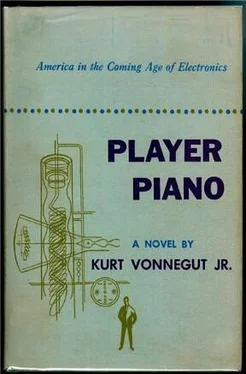"And what does an anthropologist do these days?" said Paul.
"Same thing a supernumerary minister does - becomes a public charge, a bore, or possibly a rum-dum, or a bureaucrat." He looked back and forth between Paul and Finnerty. "You, I know, Doctor Proteus. And you?"
"Finnerty, Edward Francis Finnerty, Ph.D., one-time EC-002."
"There's a collector's item - a double-o-two number!" said Lasher. "I've known several single-o men, but never a double-o. I guess you're the highest classification I ever had friendly words with. If the Pope set up shop in this country, he'd be only one notch up - in the R-numbers of course. He'd be an R-001. I heard somewhere that the number was being held for him, over the objections of Episcopal bishops who want R-001 themselves. Delicate business."
"They could give him a negative number," said Paul.
"That the Episcopalians would go along with. My glass is empty."
"What was this business about the people across the river being the opposition?" said Paul. "You think they do the Devil's work, do you?"
"That's pretty strong. I will say you've shown up what thin stuff clergymen were peddling, most of them. When I had a congregation before the war, I used to tell them that the life of their spirit in relation to God was the biggest thing in their lives, and that their part in the economy was nothing by comparison. Now, you people have engineered them out of their part in the economy, in the market place, and they're finding out - most of them - that what's left is just about zero. A good bit short of enough, anyway. My glass is empty."
Lasher sighed. "What do you expect?" he said. "For generations they've been built up to worship competition and the market, productivity and economic usefulness, and the envy of their fellow men - and boom! it's all yanked out from under them. They can't participate, can't be useful any more. Their whole culture's been shot to hell. My glass is empty."
"I just had it filled again," said Finnerty.
"Oh, so you did." Lasher sipped thoughtfully. "These displaced people need something, and the clergy can't give it to them - or it's impossible for them to take what the clergy offers. The clergy says it's enough, and so does the Bible. The people say it isn't enough, and I suspect they're right."
"If they were so fond of the old system, how come they were so cantankerous about their jobs when they had them?" said Paul.
"Oh, this business we've got now - it's been going on for a long time now, not just since the last war. Maybe the actual jobs weren't being taken from the people, but the sense of participation, the sense of importance was. Go to the library sometime and take a look at magazines and newspapers clear back as far as World War II. Even then there was a lot of talk about know-how winning the war of production - know how , not people, not the mediocre people running most of the machines. And the hell of it was that it was pretty much true. Even then, half the people or more didn't understand much about the machines they worked at or the things they were making. They were participating in the economy all right, but not in a way that was very satisfying to the ego. And then there was all this let's-not-shoot-Father-Christmas advertising."
"How's that?" said Paul.
"You know - those ads about the American system, meaning managers and engineers, that made America great. When you finished one, you'd think the managers and engineers had given America everything: forests, rivers, minerals, mountains, oil - the works.
"Strange business," said Lasher. "This crusading spirit of the managers and engineers, the idea of designing and manufacturing and distributing being sort of a holy war: all that folklore was cooked up by public relations and advertising men hired by managers and engineers to make big business popular in the old days, which it certainly wasn't in the beginning. Now, the engineers and managers believe with all their hearts the glorious things their forebears hired people to say about them. Yesterday's snow job becomes today's sermon."
"Well," said Paul, "you'll have to admit they did some pretty wonderful things during the war."
"Of course!" said Lasher. "What they did for the war effort really was something like crusading; but" - he shrugged - "so was what everybody else did for the war effort. Everybody behaved wonderfully. Even I."
"You keep giving the managers and engineers a bad time," said Paul. "What about the scientists? It seems to me that -"
"Outside the discussion," said Lasher impatiently. "They simply add to knowledge. It isn't knowledge that's making trouble, but the uses it's put to."
Finnerty shook his head admiringly. "So what's the answer right now?"
"That is a frightening question," said Lasher, "and also my favorite rationalization for drinking. This is my last drink, incidentally; I don't like being drunk. I drink because I'm scared - just a little scared, so I don't have to drink much. Things, gentlemen, are ripe for a phony Messiah, and when he comes, it's sure to be a bloody business."
"Messiah?"
"Sooner or later someone's going to catch the imagination of these people with some new magic. At the bottom of it will be a promise of regaining the feeling of participation, the feeling of being needed on earth - hell, dignity. The police are bright enough to look for people like that, and lock them up under the antisabotage laws. But sooner or later someone's going to keep out of their sight long enough to organize a following."
Paul had been watching his expression closely, and decided that, far from being in horror of the impending uprising, Lasher was rather taken by the idea. "And then what?" said Paul. He picked up his glass and rattled the ice cubes against his teeth. He'd finished his second drink and wanted another.
Lasher shrugged. "Oh, hell - prophecy's a thankless business, and history has a way of showing us what, in retrospect, are very logical solutions to awful messes."
"Prophesy anyway," said Finnerty.
"Well - I think it's a grave mistake to put on public record everyone's I.Q. I think the first thing the revolutionaries would want to do is knock off everybody with an I.Q. over 110, say. If I were on your side of the river, I'd have the I.Q. books closed and the bridges mined."
"Then the 100's would go after the 110's, the 90's after the 100's, and so on," said Finnerty.
"Maybe. Something like that. Things are certainly set up for a class war based on conveniently established lines of demarkation. And I must say that the basic assumption of the present setup is a grade-A incitement to violence: the smarter you are, the better you are. Used to be that the richer you were, the better you were. Either one is, you'll admit, pretty tough for the have-not's to take. The criterion of brains is better than the one of money, but" - he held his thumb and forefinger about a sixteenth of an inch apart - "about that much better."
"It's about as rigid a hierarchy as you can get," said Finnerty. "How's somebody going to up his I.Q.?"
"Exactly," said Lasher. "And it's built on more than just brain power - it's built on special kinds of brain power. Not only must a person be bright, he must be bright in certain approved, useful directions: basically, management or engineering."
"Or marry someone who's bright," said Finnerty.
"Sex can still batter down all sorts of social structures - you're right," Lasher agreed.
"Big tits will get you in anywhere," said Finnerty.
"Well, it's comforting to know that something hasn't changed in centuries, isn't it?" Lasher smiled.
There was a mild commotion at the bar, and Lasher leaned out of the booth to see what was going on. "Hey," he called, "Luke Lubbock - come over here."
Luke, the serious old man who had borne the elephant tusk at the head of the parade, came over from the bar, gulping his beer as he came, and looking nervously at the clock. He was perspiring and short of breath, like a man who'd been running. He had a large parcel wrapped in brown paper under his arm.
Читать дальше








![Курт Воннегут - Вампитеры, фома и гранфаллоны [litres]](/books/397997/kurt-vonnegut-vampitery-foma-i-granfallony-litre-thumb.webp)